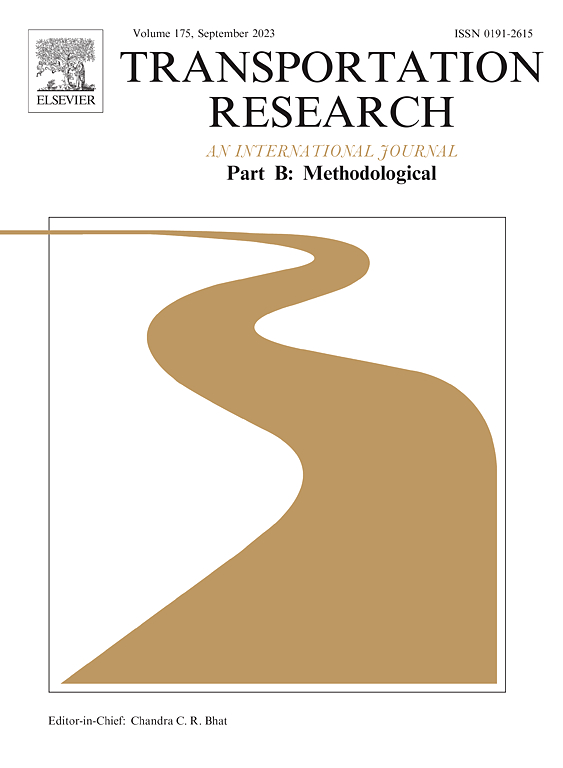电动汽车时代停车、车辆充电和车联网服务的经济分析
IF 6.3
1区 工程技术
Q1 ECONOMICS
引用次数: 0
摘要
随着电气技术(尤其是车联网或 V2G 技术)的发展,电动汽车(EV)现在可以用作电力存储。电动汽车的潜在电力储存能力可为电力系统提供额外的灵活性,从而有助于提高电网的整体效率、稳定性和可靠性。有了 V2G 设施,电动汽车用户可以选择在车辆停放或充电时将车辆共享给电网作为临时储能(称为 "V2G 停车或充电服务")。本研究探讨了在电动汽车用户选择均衡的前提下,停车、充电和 V2G 运营商的定价和容量决策。要求停车或充电的电动汽车用户可以选择(传统的)专用停车或充电时段(由停车或充电运营商管理),或者选择 V2G 设施的时段(由 V2G 运营商管理),这样他/她的车辆就可以在停车或充电时由电网用作临时存储。我们提出并分析了电动汽车用户在停车、充电和 V2G 服务提供条件下的选择均衡,然后研究了停车、充电和 V2G 运营商在不同市场制度下的最优服务费和容量决策,在不同市场制度下,运营商可能相互竞争,也可能相互合作(例如,充电和 V2G 设施可能联合运营)。主要结论如下(i) 引入基于 V2G 的停车/充电服务可能会为 V2G 运营商带来正利润,也会使要求停车或充电的客户受益,但停车和充电运营商会蒙受损失。(ii) 运营商之间的竞争往往会降低服务费,而合作往往会提高服务费,并为 运营商带来更多利润。(iii) 停车、充电或 V2G 设施的最佳容量应平衡边际容量获取成本和边际设施搜寻时间成本。(iv) 当 V2G 运营商与停车/充电运营商合作时,如果停车/充电运营商通过合作获得的额外收益小于 V2G 运营商的额外收益,则停车/充电的最优服务费应较小,从而使停车者/充电者受益(在引入 V2G 服务后)。(v) 停车(或充电)运营商与 V2G 运营商之间的合作也可能使充电(或停车)运营商受益。总之,本研究加深了人们对停车和充电运营商对新出现的基于 V2G 的停车和充电服务的反应的理解,并为如何规划和优化 V2G 服务提供了启示。本文章由计算机程序翻译,如有差异,请以英文原文为准。
Economic analysis of parking, vehicle charging and vehicle-to-grid services in the era of electric vehicles
With the advances in electrical technologies (especially the vehicle-to-grid or V2G technologies), electric vehicles (EVs) now can be used as power storage. The latent power storage capacity in EVs can provide additional flexibility to the power system, and thus helps enhance the overall efficiency, stability and reliability of the power grid. With the V2G facility in place, EV users can choose to share their vehicles to the power grid as temporary storage while the vehicle is being parked or charged (termed as ‘V2G parking or charging service’). This study investigates the pricing and capacity decisions of parking, charging and V2G operators, subject to the EV users’ choice equilibrium. An EV user who demands parking or charging can choose the (conventional) dedicated parking or charging slot (managed by the parking or charging operator) or the slot of V2G facility such that his/her vehicle can be used by the power grid as temporary storage while being parked or charged (managed by the V2G operator). We formulate and analyze the EV user choice equilibrium subject to parking, charging and V2G service provision, and then investigate parking, charging and V2G operators’ optimal service fare and capacity decisions in different market regimes, where the operators may compete or cooperate with each other (e.g., charging and V2G facilities might be operated jointly). The main findings are as follows. (i) Introducing the V2G-based parking/charging service might earn a positive profit for the V2G operator and also benefit customers who request for parking or charging, but the parking and charging operators will suffer a loss. (ii) The competition between operators tends to reduce the service fares, while cooperation tends to increase the fares and yield more profits for the operators. (iii) The optimal capacity of parking, charging, or V2G facilities should be set to balance the marginal capacity acquisition cost and the marginal facility searching time cost. (iv) When V2G operator cooperates with parking/charging operator, if the additional gains of parking/charging operator through cooperation are smaller than that of V2G operator, the optimal service fare of parking/charging should be smaller, and thus will benefit the parkers/chargers (after V2G service is introduced). (v) The collaboration between parking (or charging) and V2G operators might also benefit the charging (or parking) operator. Overall, this study enhances the understanding in relation to parking and charging operators’ reactions to emerging V2G-based parking and charging services, and provides insights regarding how the V2G service should be planned and optimized.
求助全文
通过发布文献求助,成功后即可免费获取论文全文。
去求助
来源期刊
CiteScore
12.40
自引率
8.80%
发文量
143
审稿时长
14.1 weeks
期刊介绍:
Transportation Research: Part B publishes papers on all methodological aspects of the subject, particularly those that require mathematical analysis. The general theme of the journal is the development and solution of problems that are adequately motivated to deal with important aspects of the design and/or analysis of transportation systems. Areas covered include: traffic flow; design and analysis of transportation networks; control and scheduling; optimization; queuing theory; logistics; supply chains; development and application of statistical, econometric and mathematical models to address transportation problems; cost models; pricing and/or investment; traveler or shipper behavior; cost-benefit methodologies.

 求助内容:
求助内容: 应助结果提醒方式:
应助结果提醒方式:


